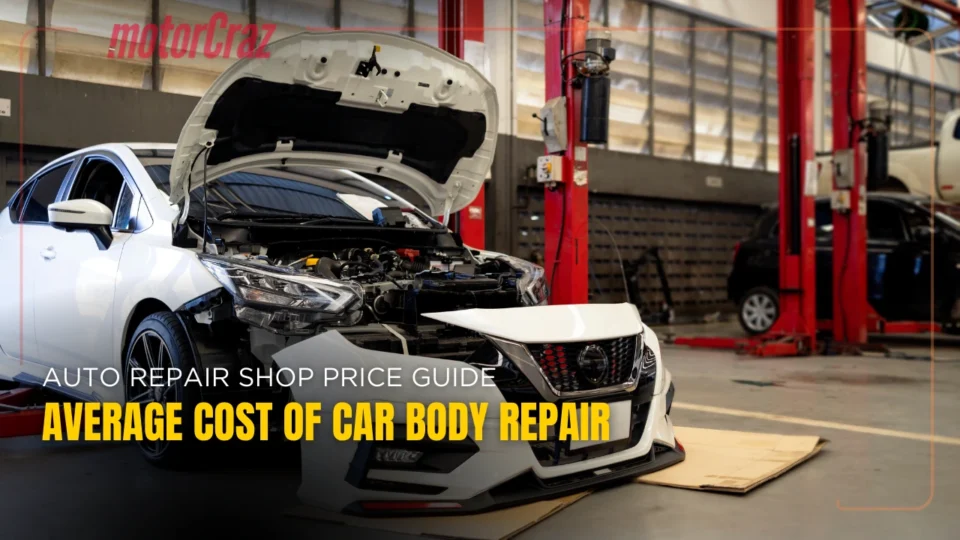When your car gets damaged, one question comes first: how much will it cost? If you’re searching for answers like auto body repair cost, body shop cost, or average collision repair cost, this guide is for you. I wrote this to be more useful than generic lists — it explains why prices vary, gives realistic price ranges, and shows how to get an accurate estimate from an auto repair shop.
Why prices vary (and what shops don’t always tell you)
Repair costs are driven by things most people don’t see at first glance. Two cars with “the same” bumper damage can end up with wildly different bills because one needs sensor recalibration, a new reinforcement bar, or paint blending across three panels. Labor rates vary by city. Newer cars with driver-assist tech often require calibrated sensors or OEM parts.
Authoritative organizations and industry data repeatedly show the same patterns: labor rates, parts choice (OEM vs aftermarket), and hidden internal damage matter most. We’ll use realistic national ranges below, but remember: your local auto repair shop quote is the final word.
Real cost ranges (clear, realistic numbers)
The table below gives practical price ranges you can expect in 2025. Ranges reflect national averages and common shop pricing —think of the low end as a simple repair at an independent shop, and the high end as OEM parts, high labor areas, or luxury vehicles.
| Repair type | Typical cost range (USD) | Notes / what affects price |
| Minor dent or scratch (paintless where possible) | $50 – $150 | Small door dings, no paint damage |
| Dent repair with paint work | $150 – $600 | Paint blending, multiple panels up cost |
| Bumper repair / replacement (parts + paint) | $300 – $1,600 | Bumper repair/replacement (parts + paint) |
| Luxury bumper w/ sensors | $1,500 – $2,500+ | OEM sensors and bumper materials cost more |
| Windshield replacement | $250 – $1,000 | Advanced sensors in windshield add cost |
| Sensors, mounts, and paint increase the price | $500 – $5,000 | Simple shocks vs full control-arm/strut swaps |
| Full or partial respray (paint job) | $300 – $7,500+ | Prep, primer, color match, and finish level matter |
These ranges reflect aggregated figures commonly cited by industry sources (AAA, CostHelper, Insurance analysis). Use them as a planning baseline, your auto repair shop estimate will zero in on exact cost.
Average collision repair cost: what to expect after a crash
Collision repairs are where unpredictability spikes. Cosmetic damage might be $500–$1,500, while repairs that touch frames, airbags, or suspension can push past $5,000. Two main takeaways: 1) get a written estimate that lists parts and labor separately, and 2) assume the number could rise after teardown reveals hidden damage.
If you want a midline number, many industry sources peg a typical collision repair for moderate damage in the $2,000–$4,000 range — but this varies heavily by vehicle type and region.
How online auto repair cost estimators work (and why they’re rough)
Auto repair cost estimator tools are handy for quick research, but they’re based on averages and cannot see hidden issues. Estimators typically use national labor rates, generic part prices, and common repair hours. They do not inspect your car.
Use an estimator to get a ballpark. Then, book a physical inspection at a reputable auto repair shop for a firm quote. If you need templates, request a written estimate that includes: parts list with OEM/aftermarket designation, labor hours, and paint work or calibration costs.
Insurance, deductibles, and out-of-pocket math
Most policies have a deductible of $500–$1,000. That means minor body work under your deductible is usually paid out-of-pocket to avoid filing a claim that could raise premiums. Simple rule of thumb: if the repair is less than your deductible + inconvenience cost (paperwork, higher premium risk), paying out of pocket is often better. For larger claims, insurers typically cover the rest after the deductible.
Also, rental cars, towing, and storage fees can add hundreds to the final bill if not covered by your policy.
Suggestion: Top 5 Touchless Automatic Car Washes in Las Vegas for a Damage-Free Clean
Hidden costs shops sometimes forget to mention
Beyond parts and labor, watch for:
- Paint blending across adjoining panels (adds time & material).
- Sensor recalibration (cameras, radar for ADAS).
- Frame straightening if the subframe is bent.
- Supplemental repairs were discovered after disassembly.
Ask your auto repair shop to flag any potential supplemental work up-front and tell you the approval process for additional costs.
Choosing the right auto repair shop (without getting ripped off)
A good shop balances honesty with technical skill. Look for:
- Clear, itemized estimates (parts vs labor).
- Written warranties on repair work.
- Certified technicians (ASE, I-CAR training) and evidence of experience with your make.
- Transparent communication about OEM vs aftermarket parts.
Don’t pick a shop only based on the lowest price. A slightly higher quote from a reputable shop often saves money long-term.
FAQs (optimized for search)
What is the average car body repair cost?
Minor repairs can be under $200, but typical collision repairs for moderate damage often fall between $2,000 and $4,000. Significant structural repairs easily exceed $5,000.
How much does it cost to replace a bumper?
Expect $300–$1,600 for most vehicles; bumpers on luxury models or those with sensors can cost $1,500–$2,500+.
What are typical body shop prices for paint jobs?
Basic resprays start around $300; mid-level full resprays commonly cost $1,000–$4,500, while premium/custom finishes exceed $5,000.
Are online auto repair cost estimator tools accurate?
They give helpful ballpark figures but can’t replace a physical inspection. Use them for budgeting, not final decisions.
How do I avoid surprise fees?
Get a detailed written estimate and ask how the shop handles supplemental repairs found after teardown.

